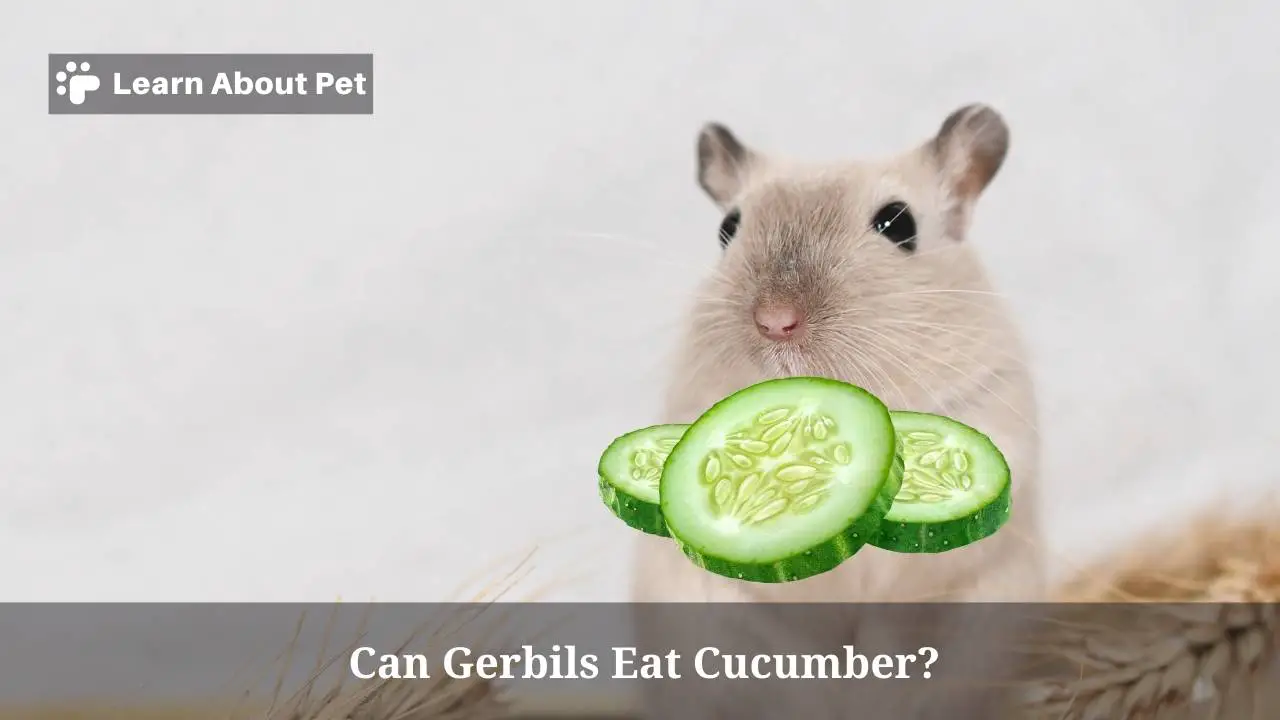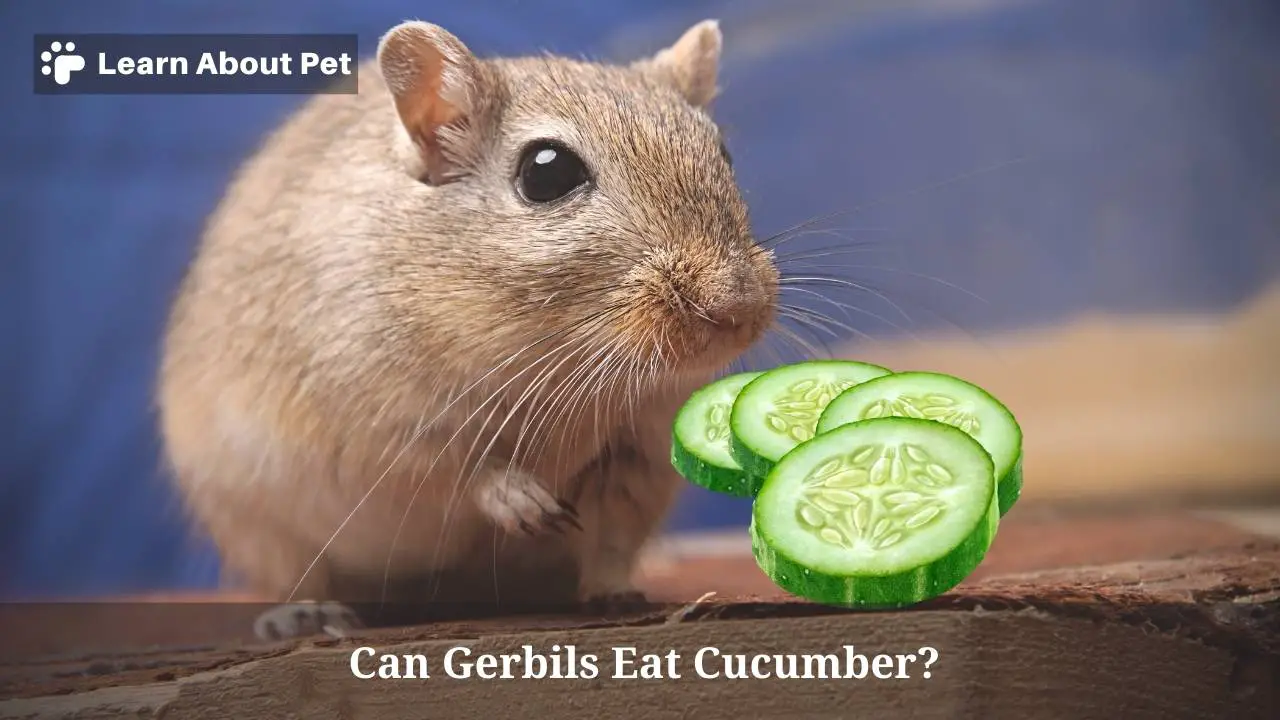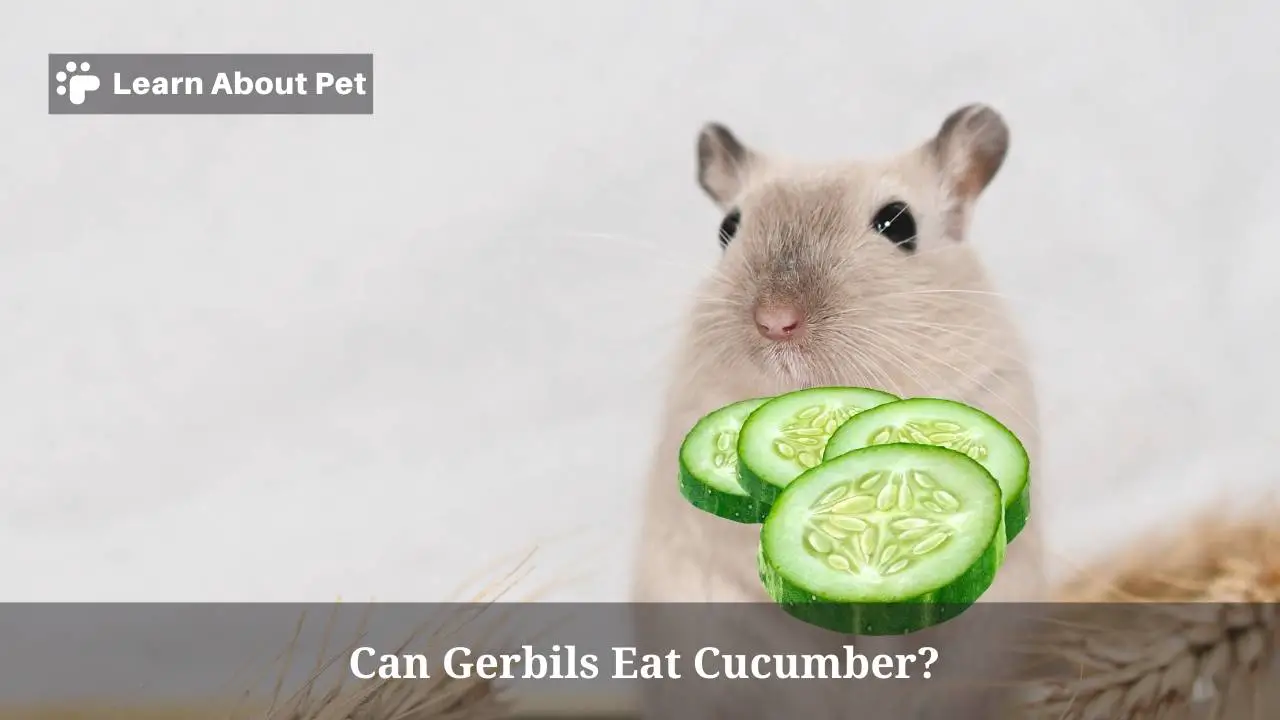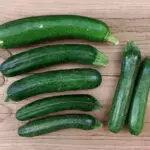One of the key things that owners of pet gerbils usually want to know is whether or not they should feed the gerbils on cucumber. In this article, we explore that subject comprehensively.
Can gerbils eat cucumber? Yes, gerbils may eat small cucumber portions once in a while. Cucumber has some potential nutritional benefits for gerbils. But cucumber also has so much water in it that it can cause diarrhea and electrolyte imbalances in gerbils, if they eat lots of it.
Thus cucumber is only appropriate for gerbils in small bits, and as a rare/occasional treat: certainly not a staple food.

Is Cucumber Safe For Gerbils To Eat?
In relatively small portions, cucumber is safe for gerbils to eat. In bigger quantities, cucumber is unsafe for gerbils to eat.
Thus it is important to have some understanding of the portion sizes within which are gerbils allowed cucumber.
Remember, the safety of cucumber for gerbils is dependent on portion sizes. Small bits of cucumber are safe for gerbils, while bigger portions of cucumber are not safe for gerbils.
The main problem with lots of cucumber for gerbils is in that it can lead to diarrhea. Lots of cucumber even has potential to cause electrolyte imbalances in gerbils. All this is due to the cucumber’s high water content.
In any portion of cucumber, there is usually at least 95% water. Thus even when a gerbil eats a little cucumber, it is still taking very much water: perhaps more than its body is meant to handle.
Once such indirectly ingested water is in the gerbil’s body, it almost certainly triggers diarrhea. It can also cause electrolyte imbalance straightway. Or the resultant diarrhea may lead to dehydration, which in turn can also cause electrolyte imbalance.
Either way, it is quite risky.
To be sure, one may ask, is cucumber poisonous to gerbils? And the answer is ‘no’. There is really nothing in cucumber that is outright poisonous to gerbils. The only problematic element in cucumber is the moisture content.
Another pertinent question here: do gerbils eat cucumber in the wild? And the answer is that there may not be much cucumber in places where gerbils live natively.
However, when gerbils encounter cucumber-like foods in the wild, they relish them. So this is the context against which we offer pet gerbils cucumber to eat.
Do Gerbils Like Cucumber?
There are some gerbils that really like cucumber. Then there are some gerbils that appear to dislike cucumber. We also have gerbils that are apparently indifferent to cucumber.
The only way to know whether a particular gerbil likes cucumber is by testing. Give the gerbil a little cucumber, and see how it reacts to it.
Just know that there are some gerbils that may dislike cucumber or be indifferent to it.
As for the gerbils that find cucumber enjoyable, that is usually to some extent due to cucumber’s crunchy nature. Gerbils really love crunchy things, and cucumber meets the definition for crunchiness.
Can A Gerbil Eat Cucumber?
Normally, when a portion of cucumber is presented to a gerbil, the gerbil is able to eat it.
Even the few gerbils that dislike cucumber seem to nonetheless be able to at least recognize it as food.
As we saw, in small bits, cucumber is quite safe for gerbils. And the nutrients in cucumber – including vitamins and minerals – are great nutrients for gerbils.
This then means that eating cucumber is alright: provided the gerbil doesn’t overfeed on this water-based veggie/fruit.
Which Cucumber Can Gerbils Eat?
You may find cucumber in fresh or pickle form. The cucumber can also be raw or cooked. And we do have green cucumber, white cucumber and yellow cucumber.
The next question is on which specific varieties/forms of cucumber gerbils can eat, and which ones they shouldn’t.
Can Gerbils Eat Fresh Cucumber?
Fresh cucumber has nutrients that are quite good for gerbils – including several essential vitamins and minerals. Unfortunately, fresh cucumber also has as much as 95% water content: more than a gerbil can process regularly.
What this means is that when it comes to feeding gerbils on fresh cucumber, there are two guidelines to adhere to. Firstly give the gerbil just a little fresh cucumber.
And secondly only give the gerbil fresh cucumber infrequently (as a special treat, if you like).
Thus gerbils can eat fresh cucumber: just small portions of it, and not daily.
Can Gerbils Eat Pickle Cucumber?
Cucumber pickle is not alright for gerbils to eat. It may have vinegar and salt as well as other seasoning agents that can harm gerbils.
Thus it is best to refrain from giving gerbils cucumber pickle to eat.
Can Gerbils Eat Raw Cucumber?
Raw cucumber is a food that gerbils can eat – but as an occasional treat and even then, in small bits.
While the nutrients in raw cucumber are intact, the moisture content in it can be overwhelming to gerbils.
That is why when it comes to feeding gerbils on raw cucumber, a high level of moderation is necessary.
Can Gerbils Eat Cooked Cucumber?
Many gerbils may tend to dislike eating cooked cucumber. Moreover, cooking cucumber is likely to make it even more water-logged.
Ultimately, if what you have is plain cooked cucumber (with no seasonings), and your gerbils don’t mind eating it, then it is alright – in small portions.
Can Gerbils Eat Green Cucumber?
For us humans, green cucumber is considered to be one of the best forms of cucumber. For gerbils too, green cucumber is largely alright, as long as the gerbils eat a small quantity of it, with many days in between the green cucumber servings.
If a gerbil eats green cucumber too much (or with no adequate time between the servings), it may develop diarrhea. Other complications could then also arise – including electrolyte imbalances.

Can Gerbils Eat White Cucumber?
White cucumber is not known to be bad for gerbils. Therefore gerbils may eat such white cucumber. But like all other forms of cucumber, it is water-logged, and capable of causing diarrhea and other issues in gerbils.
Thus if gerbils have to be fed on white cucumber, it better be small portions of it, as an occasional treat.
Can Gerbils Eat Yellow Cucumber?
A small quantity of yellow cucumber should be more or less alright for gerbils to eat.
But beware that if a gerbil eats too much yellow cucumber, there is a high risk of it getting diarrhea.
Also beware that if a gerbil starts eating yellow cucumber as a staple, it may start getting malnourished. That is because yellow cucumber is not the type of food gerbils are meant to be having a staple.
But just a tiny bit of yellow cucumber once per week (or even less frequently) should be alright for gerbils.
Can Gerbils Eat Cucumber Skin?
Cucumber skin tends to be crunchy – exactly the sort of thing gerbils would draw much pleasure munching.
Then again, cucumber skin may have pesticide residues, and those are not alright for gerbils. Thus if you have to give cucumber skin as gerbil food, at least clean it well.
On another note, remember that cucumber skin still has quite a bit of moisture content. Therefore don’t offer such cucumber skin very frequently as gerbil food.
Can Gerbils Eat Cucumber Seeds?
Cucumber seeds are not known to be toxic or otherwise potentially harmful to gerbils.
Thus you may offer your gerbil cucumber seeds – but with awareness that the gerbil may eat or reject them.
On another note, understand that cucumber seeds are not really in the list of seeds that should be staples (regular food seeds) for gerbils.
Thus even if your gerbil likes cucumber seeds, don’t turn them into a staple for the gerbil.
Can Gerbils Eat Cucumber Leaves?
A pinch of cucumber leaves or so may be alright for gerbils to eat.
The cucumber leaves cannot really be said to be toxic or outright harmful to gerbils in any way. But lots of cucumber leaves, just like any other leaves, can cause digestive tract blockages for gerbils.
Thus if you have to give your gerbil cucumber leaves, just give it a pinch or so of the leaves. And do so knowing that some gerbils may not accept to eat the cucumber leaves altogether.
How To Feed Gerbils On Cucumber?
Focus here should be on learning how to prepare cucumber for gerbils at home.
In that regard, the first step is to clean the cucumber well. Don’t feed gerbils on cucumber that retains any sort of pesticide residue. Thus clean the cucumber meant for eating by gerbils well, to avoid that.
The next step is to portion the cucumber carefully, to ensure that the gerbil doesn’t have excess quantity of it.
Thereafter, the next step is to chop the cucumber, to make it safe for the gerbil to eat.
Finally, you just lay the cucumber before the gerbils, and see if they will eat it. Just remember that gerbils may not show much interest in eating foods like cucumber at all times.
How Often Can You Feed Gerbils Cucumber?
After learning how to prepare cucumber for gerbils, we next need to know how often can gerbils have cucumbers.
As we said and reiterated earlier, feeding gerbils cucumber daily (or too often) is not safe.
Thus you should never allow yourself to get into a situation of feeding gerbils on cucumber (in any of its forms/varieties) more than once per week.
If you feed your gerbil on cucumber more than once per week, it may start developing runny stomach issues.
At some point, there could even be electrolyte imbalances on account of the gerbil getting too much water from cucumber.
Thus at most, give your gerbils cucumber as food once per week. Some people actually would give it even less frequently, especially if the gerbils are getting other water-logged foods.
How Much Cucumber Can Gerbils Eat?
After establishing that gerbils should eat cucumber no more than once per, we next need to focus our attention on how much of the cucumber is alright for them.
What is the ideal portion size of cucumber for gerbils, and how much cucumber is too much for gerbils?
Now on how much is enough cucumber for a gerbil – that is one teaspoonful in a day. And touching on how much is too much cucumber for gerbils, that is any portion bigger than one teaspoonful.
These portion sizes are critical, especially if you want to learn how to prevent gerbils from overfeeding on cucumber.
If you ignore the portion sizes, you may in due course have the unenviable task of trying to work out what to do if gerbils overfeed on cucumber.
And that includes having to organize costly, inconvenient and time-consuming vet visits due to the resultant diarrhea.
Final Verdict – Can Gerbils Eat Cucumber
Gerbils can eat some little cucumber: like just one teaspoonful of it, once per week at most.
Cucumber may have some vitamins and minerals, but much of it (above 95%) is water, which can be problematic for gerbils.
The water content in cucumber can lead to gerbils having diarrhea. The cucumber moisture content can even lead to electrolyte imbalances in gerbils, directly or indirectly.
That is why moderation in portion sizes and serving frequency is important, while feeding gerbils on cucumber.

Since veggies/fruits like cucumbers often have pesticide residues on them, clean the cucumber well before giving it to your gerbils.
You may also chop up the cucumber a bit, to make it easier and safer for gerbils to eat.
Just ensure that an individual gerbil doesn’t surpass eating one teaspoonful of cucumber within a day.
Also ensure that you don’t offer gerbils cucumber more than once per week.
As a pet lover, make sure to learn about pet more and give your pet gerbil a good and comfortable life!

Welcome to Learn About Pet. My name is Rajkumar Ravichandran and I love all pets, travel, and amazing food. I write about my passion and personal experience caring for multiple pets in this blog! ❤️
Post Disclaimer
DISCLAIMER: THIS BLOG OR WEBSITE, "Learn About Pet", DOES NOT PROVIDE YOU WITH MEDICAL ADVICE AND IS NOT A SUBSTITUTE FOR MEDICAL ADVICE. ALWAYS GET IN TOUCH WITH YOUR PERSONAL VETERINARIAN AND USE INFORMATION HERE AS GENERAL ADVICE.
The information, including but not limited to, text, graphics, images and other material contained on this website are for informational purposes only. No material on this site is intended to be a substitute for professional veterinary advice, food recommendation, diagnosis, or treatment. Always seek the advice of your veterinarian or other qualified health care provider with any questions you may have regarding a medical condition or for pet food related questions.







